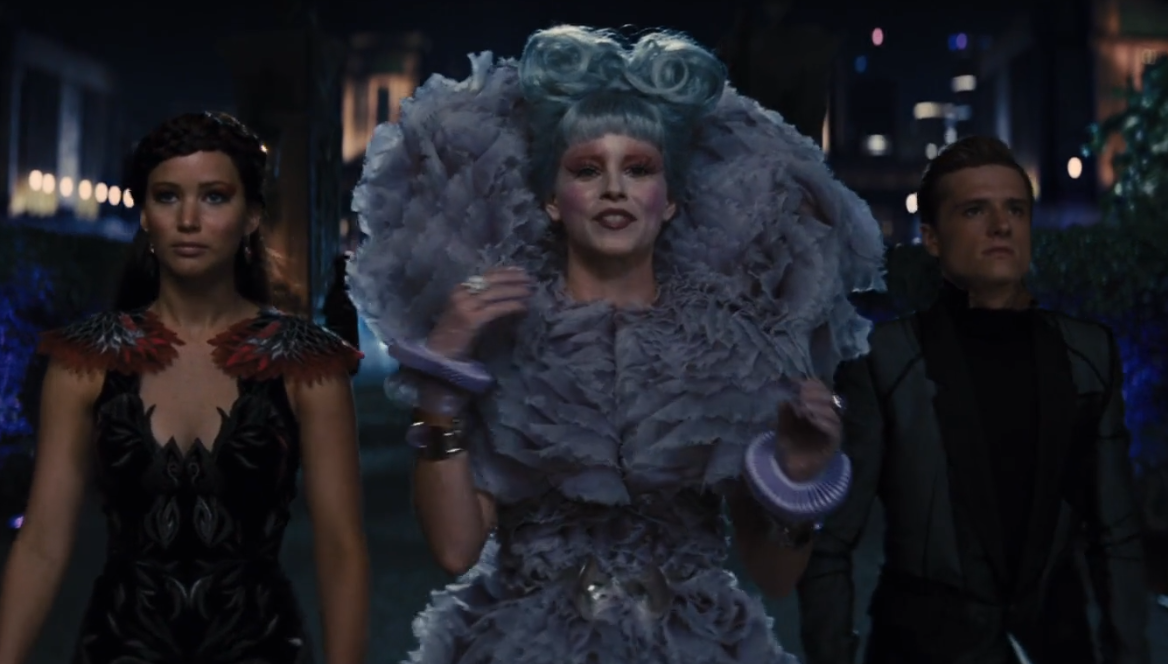Fire fire everywhere, and no water to put it out. The pop culture zeitgeist has been swirling around The Hunger Games: Catching Fire for months now. Fortunately for the Internet, it delivers the goods. For a young adult story, Catching Fire has some very adult themes about governance and media surrounding what is essentially a battle to the death. Catching Fire is a strong enough film to excite ALL people, not just tweens debating Team Peeta vs. Team Gale (seriously guys, it’s obviously Peeta).
Fresh off her victory in the 74th Hunger Games, Katniss Everdeen (Jennifer Lawrence, the girl on fire) enjoys her brief time back home with best friend Gale (Liam Hemsworth) before she must depart on her victory tour with Peeta (Josh Hutcherson), her co-victor. They have been given strict orders from the President (Donald Sutherland) to keep up their charade of romance: the districts are bordering rebellion and openly confronting the government. As the tour rolls on, the President realizes that Katniss has become the rebels’ symbol for hope, so he enlists the help of Plutarch (Philip Seymour Hoffman), the chairman of the 75th Hunger Games, to eliminate her. Plutarch suggests that previous winners of the games compete against each other, thus using the games to eliminate Katniss. So again, Peeta and Katniss enlist the help of former winner Haymitch (Woody Harrelson) and liaison Effie (Elizabeth Banks) to figure out how to survive the 75th Hunger Games.
The first hour is the strongest of Catching Fire. The insurrection and government suppression creates a tone of dread and powerlessness. At the first stop on the victory tour, someone gets shot after defying the government. With each little act, anger and defiance to the government grow bigger and bigger across all the districts. When the media intervenes with trite storylines, the contestants openly mock the stupidity of the host. The shift in tone succeeds in creating a weird feeling when the games start. Gone is the terror of the unknown in the first movie, replaced by weird coincidences and alliances. The movie cleverly drops hints at its endgame but not enough to give away its little bombshells in the third act. Credit goes to Director Francis Lawrence (and fantastic screenwriters Simon Beaufoy and Michael Arndt) for establishing tonally how widespread the citizens’ resentment of the government is and the many ways the government attempts to quell it.
No young adult novel would be complete without some sort of love triangle. What makes the Hunger Games’s triangle so enjoyable is that Peeta and Gale are both positioned in Catching Fire to be quality choices. Gale clearly is Katniss’s link to the world and people she relates to, and their value system is shared. Peeta gives Katniss a level head when the confusion and threats create a sense of hysteria (whether it is from the government or from the games themselves). Neither forces her to choose one or the other, but they both make themselves available to her if she needs help. Katniss’s decision is obviously put on hold because of her circumstances, but the decision is one of the compelling subplots started by Catching Fire and hopefully resolved in Mockingjay.
Much like the superhero movies, The Hunger Games cast is loaded with talent, elevating even minor roles into the spotlight. The anchor here is Jennifer Lawrence, fresh off her Oscar win. Katniss starts off with PTSD, and slowly grows more angry and defiant of the President because of the threats on her family and friends. I watched some interviews of Lawrence promoting the film; her personality demands the attention she rightly deserves. Here, the writers/director mostly get out of her way and let her just be, with great effect. The closing shot of her is a testament to how many emotions she can create with just her face. The surprise to me was Josh Hutcherson, who was the damsel in distress in the first Hunger Games. Here, he is every bit as strong as Katniss but in a quieter complimentary way. Hutcherson gives Peeta a very casual media affront, but when the setting is more intimate, he genuinely tries to connect and understand the people he talks to. Liam Hemsworth gets to be something other than pretty as Gale; the fact that I had to consider him in the love triangle is well-earned by Thor’s brother. Woody Harrelson is always welcome as a condescending drunk, a solid role for him. Elizabeth Banks and Lenny Kravitz are surprisingly affecting as Effie and Cinna, clearly caring for their winners but stuck in the system. Stanley Tucci needs to be an MTV host at some point because of how great he is here. Donald Sutherland will be a very intimidating villain as President Snow: his one big scene with Katniss sizzled with powerful menace. The newcomers also acquit themselves pretty well. Philip Seymour Hoffman and Jeffrey Wright bring a sense of cold intelligence and logic in their two roles. Jena Malone needs to be in more things, but she easily steals every scene she is in as unhinged Joanna. The big gamble here is Sam Claflin (who almost ruined Snow White and the Huntsman by himself) as key tribute Finnick Odair. Fortunately, the writers flesh him out enough and give him enough personality that he doesn’t embarrass himself around better actors.
Catching Fire is being called the Hunger Games’s Empire Strikes Back in some circles, high praise justified by the collective efforts of the Catching Fire Team. The movie builds upon the themes of the first movie and expands them to help set up a powerful fight in the two-part finale. It also creates an intriguing oral question: who does Stanley Tucci’s teeth in the movie? They were as bright as high beams on a dark road.

